|
|
|
Sort Order |
|
|
|
Items / Page
|
|
|
|
|
|
|
| Srl | Item |
| 1 |
ID:
137475
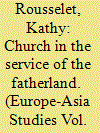

|
|
|
|
|
| Summary/Abstract |
The Russian Orthodox Church intensifies activities that it labels as patriotic activities and is an important participant in the patriotic education programmes organised by the state. Going beyond institutional types of discourse, this essay examines how believers experience patriotism in their daily lives, how religion nurtures the patriotic sentiment. Priests and the laity present themselves as being in the service of a country in combat. The Orthodox Church combines various moral values, which are at the heart of the patriotism of believers. Russian religious patriots have different relations with the state, and their patriotism sometimes diverges from the official calls. This essay draws on Church publications, interviews with priests and laity since 2008 and observation of religious events.
|
|
|
|
|
|
|
|
|
|
|
|
|
|
|
|
| 2 |
ID:
124312
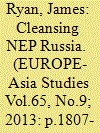

|
|
|
|
|
| Publication |
2013.
|
| Summary/Abstract |
This essay offers a case study of how the Bolshevik state reacted to popular, sometimes violent, opposition and resistance to its policies during the early period of New Economic Policy. The case study concerns the ruling Bolshevik Party's repressive approach to the Russian Orthodox Church in 1922. This culminated in show trials and executions of clergy and lay believers in response to resistance throughout the country to the state's campaign of collecting church valuables that year, ostensibly to provide relief for victims of a catastrophic famine that afflicted much of southern Russia in 1921-1922.
|
|
|
|
|
|
|
|
|
|
|
|
|
|
|
|
| 3 |
ID:
111948
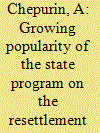

|
|
|
|
|
| Publication |
2012.
|
| Summary/Abstract |
A. Chepurin: Assisting in the voluntary resettlement to Russia of compatriots living abroad is an important area of our work, although it is clear that only a small part of the multi-million Russian diaspora, with which Russia is continuing to build a positive and friendly dialogue, will return to their country of origin in the near future.
|
|
|
|
|
|
|
|
|
|
|
|
|
|
|
|
| 4 |
ID:
112790
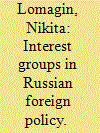

|
|
|
|
|
| Publication |
2012.
|
| Summary/Abstract |
Among the domestic interest groups that play a role in influencing Russian foreign policy the Russian Orthodox Church has become an important actor. Its most important role has been that of supporting the emergence of a new nationalist Russian identity to undergird Russian policy. On specific policy issues, it has advocated the political reunification of Eastern Slavic Orthodox peoples, the emergence of a multipolar international system and the restatement of traditional values as the foundation for the pursuit of global human rights.
|
|
|
|
|
|
|
|
|
|
|
|
|
|
|
|
| 5 |
ID:
166650
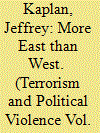

|
|
|
|
|
| Summary/Abstract |
Before there was hybrid warfare or its more innocuously styled component information warfare, there were Soviet Active Measures (Aктивные мероприятия). Conceived in 1948 and fully implemented by the 1970s, Active Measures were a palate of techniques designed to both deceive the West and to turn Western public opinion toward whatever the Soviet policy of the moment might be. “More East than West” presents a brief introduction to the Active Measures program which is followed by a single case study, that of the World Council of Churches (WCC). The image of the World Council of Churches as a Cold War pawn of the Soviet Union has become set in the American popular consciousness. It was not always so. At its birth in 1948, the WCC was seen as a promising ecumenical experiment that might serve to better unite the Christian churches of the world. Its birth, however, coincided precisely with the emergence of the Cold War and the organization was soon dragged kicking and screaming into the conflict. The Americans in the era of President Harry S. Truman saw in the group a potential ally for the Roman Catholic Church in erecting a spiritual barricade against the encroachment of atheistic communism. After 1961, the Soviets saw the group as a useful conduit for propaganda messages as designed by the Active Measures program that designed and disseminated Soviet propaganda throughout the Cold War. In the end, Soviet influence came to dominate the group’s political positions, but it never became an actual front group and successive American Presidents carried on a range of relationships with the WCC. This article offers a history of the early years of the Cold War struggle over the soul of the WCC.
|
|
|
|
|
|
|
|
|
|
|
|
|
|
|
|
| 6 |
ID:
130841


|
|
|
| 7 |
ID:
123208
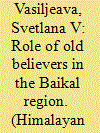

|
|
|
| 8 |
ID:
155366
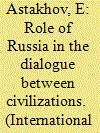

|
|
|
|
|
| Summary/Abstract |
IN THE 21ST CENTURY, core political, social, economic, and - what is more dangerous - cultural and moral values have plunged into a systemic crisis. The claims of the West to the top civilizational status don't hold water any longer. Moreover, it is obviously losing its dominant economic positions.
|
|
|
|
|
|
|
|
|
|
|
|
|
|
|
|
| 9 |
ID:
158175
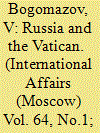

|
|
|
|
|
| Summary/Abstract |
IN TODAY'S COMPLICATED and unstable international situation, a special role belongs to influential forces that cooperate with our country in trying to stop humankind from sliding toward a catastrophe.
|
|
|
|
|
|
|
|
|
|
|
|
|
|
|
|
| 10 |
ID:
048276
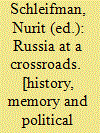

|
|
|
|
|
| Publication |
London, Frank Cass, 1998.
|
| Description |
xi, 235p.: ill.Hbk
|
| Standard Number |
071464837X
|
|
|
|
|
|
|
|
|
|
|
|
Copies: C:1/I:0,R:0,Q:0
Circulation
| Accession# | Call# | Current Location | Status | Policy | Location |
| 041592 | 947/SCH 041592 | Main | On Shelf | General | |
|
|
|
|
| 11 |
ID:
107124
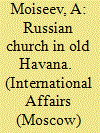

|
|
|
|
|
| Publication |
2011.
|
| Summary/Abstract |
THE FIRST RAYS OF THE MORNING SUN as it rises over Old Havana light up the gilded cupolas of the first Russian Orthodox church in Cuba and the Caribbean Basin, which was built in honor of the Icon of the Kazan Mother of God.
The church was ceremonially consecrated in the very heart of Havana almost three years ago with a large gathering of people in attendance. Cuban leader, Army General Raul Castro, Parliament Chairman Ricardo Alarcon, and other high-ranking state officials took part in the ceremony. Metropolitan of Smolensk and Kaliningrad, Chairman of the Department of External Church Relations of the Russian Orthodox Church of the Moscow Patriarchy, and now Patriarch Kirill of Moscow and All Russia performed the consecration ritual. It was he who placed the cornerstone of the future cathedral on November 14, 2004. The consecration was followed by a ceremonial liturgy.
|
|
|
|
|
|
|
|
|
|
|
|
|
|
|
|
| 12 |
ID:
150549
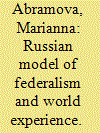

|
|
|
|
|
| Summary/Abstract |
The given paper examines the historical experience of the Russian model of federalism: its evolution from its emergence in 1918 to the present day. The author singles out peculiarities of the Soviet model of federalism, such as the absence of competition among the various subjects and the blossoming off national cultures. The new model of Russian federalism which emerged in 1991-1993 differed by its asymmetry, the complex structure of its subjects, budgetary federalism and other features. The author concludes that modernization of the existing model of federalism should proceed along the lines of strengthening the horizontal ties and infrastructures, since this will promote the evening out of the social-and-economic levels of the 85 subjects of the Russian Federation.
|
|
|
|
|
|
|
|
|
|
|
|
|
|
|
|
| 13 |
ID:
168934
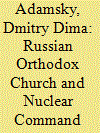

|
|
|
|
|
| Summary/Abstract |
The Russian Orthodox Church plays an immense role in current Russian national security policy. The intertwining of the church and the strategic community is nowhere more visible than in the nuclear-weapons complex, where the priesthood has penetrated all levels of command, been involved in operational activities, and positioned itself as a provider of meanings for, and guardian of, the state’s nuclear potential. The first work to highlight the phenomenon of the Russian church-nuclear nexus, this article focuses on the ecclesiastical impact on Russian nuclear command and control. The findings suggest that it is not inconceivable that the Russian military clergy—like the Soviet political officers and contrary to chaplains worldwide—might become future participants in decision making on matters of national security, and that de facto there might be two parallel chains of command authority emerging in Russia, with potential tensions between them. The article outlines the causes of this overlooked singularity and its implications for the theory and practice of international security.
|
|
|
|
|
|
|
|
|
|
|
|
|
|
|
|
| 14 |
ID:
155570
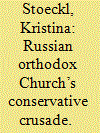

|
|
|
|
|
| Summary/Abstract |
The Russian Orthodox Church has emerged as a powerful force for cultural, social, and political conservatism.
|
|
|
|
|
|
|
|
|
|
|
|
|
|
|
|
| 15 |
ID:
142108
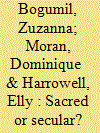

|
|
|
|
|
| Summary/Abstract |
The reconstruction of the history from the late 1980s to the mid-1990s of Soviet repressions critically influenced the social formation of Gulag memory in Russia. Amongst those re-narrating the past, the ‘Memorial’ Society and the Russian Orthodox Church most actively shaped the collective memory of Soviet repressions, trying to establish multi-layered explanatory constructs of the Gulag. Their interpretations were crystallised through contemporary memorialisation acts in significant landscapes of the past. Focusing on Solovki, Ekaterinburg, Butovo and Magadan, and analysing tensions in their memorialisation processes, we discuss secular and Orthodox interpretations of the Gulag, and their impact on the memory of the Soviet repressions in contemporary Russia.
|
|
|
|
|
|
|
|
|
|
|
|
|
|
|
|
| 16 |
ID:
112965
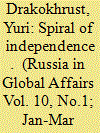

|
|
|
|
|
| Publication |
2012.
|
| Summary/Abstract |
The irony of history is that it was Lukashenko - a fighter against nationalism and a politician who promised to restore the Soviet Union - who became, in a sense, the founding father of the modern independent Belarusian state. Even within the framework of quasi-Soviet national ideology, pro-European attitudes in Belarus keep growing.
|
|
|
|
|
|
|
|
|
|
|
|
|
|
|
|
| 17 |
ID:
132113


|
|
|
|
|
| Publication |
2014.
|
| Summary/Abstract |
IN 1708, Charles XII of Sweden invaded Ukraine. His aim was to use it as a base for a final advance on Peter the Great's Moscow. The Cossack hetman, Ivan Mazeppa, decided to throw his lot in with the Swedes in a bid to secure Ukraine's complete independence. His decision split the Cossacks; while some followed Mazeppa, others elected a new leader, Ivan Skoropadsky, who reaffirmed his loyalty to the Cossack alliance with Russia. The following year, Charles was defeated by Peter at the climactic Battle of Poltava, Russia emerged as a player in European affairs, Ukraine was brought under closer control by the imperial government and Mazeppa fled into exile.
|
|
|
|
|
|
|
|
|
|
|
|
|
|
|
|
| 18 |
ID:
137472
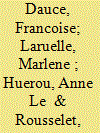

|
|
|
|
|
|
|
|